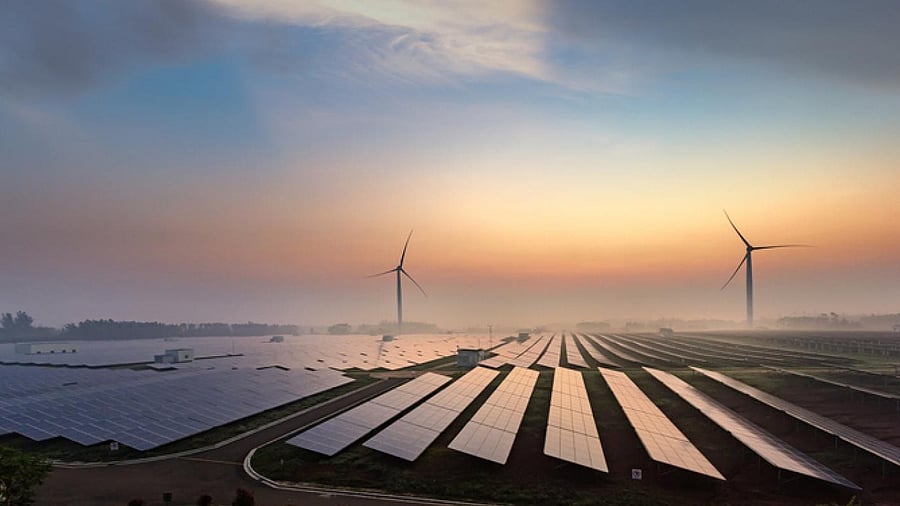
RE projects. Photo For Representation
DH Photos
Hyderabad: With already established states in its neighbourhood, Andhra Pradesh is aggressively pushing renewable energy projects to attract investments. Endowed with a vast land bank and other natural advantages, Andhra Pradesh has prioritised renewable energy as a sector to attract big-ticket investments.
Andhra Pradesh is approving project proposals and allocating land at a rapid pace. For instance, it took an average of 60 to 70 days to approve the projects of Reliance Industries Ltd (RIL), Tata Power, Clean Renewable Energy Hybrid Three Pvt. Ltd., and Belgium-based John Cockerill's investments in renewable energy sectors worth Rs 71,400 crore.
While Reliance Industries would be setting up Compressed Biogas (CBG) plants, Tata Power is planning a 400 MW solar power plant, and John Cockerill, in a joint venture with Greenko, proposed a hydrogen electrolyser manufacturing unit. Clean Renewable proposed a wind and solar hybrid project. In all these cases, land allotment was also done in record time.
In alignment with India's goals of net zero, the Andhra Pradesh government has formulated the “Andhra Pradesh Integrated Clean Energy Policy, 2024” for attracting clean energy investments and notified it on October 30, 2024. The policy aimed to add over 160 GW of renewable energy capacity, which has the potential to attract investments worth Rs 10,00,000 Crore. This, in turn, could generate an estimated employment of 7,50,000, both direct and indirect. Under the policy, Andhra Pradesh proposed to encourage both large-scale and decentralized renewable energy generation in the state.
"Last week alone, we issued GOs approving Rs 71,400 crore of projects in the renewable energy sector. Notably, they received approval in an average time of just 50 to 60 days. Minister Nara Lokesh is personally ensuring that proposals move fast. Now, in Andhra Pradesh, it's no more 'Ease of doing business' but 'Speed of doing business.' Many departments are working around the clock in Andhra in mission mode to ensure these proposals receive the necessary approvals,” a senior government official told DH.
The Mukesh Ambani-led Reliance Industries Ltd (RIL) proposal, with a major investment of Rs 65,000 crore, received approval in a record time of 41 days. RIL signed a MoU with the Government of Andhra Pradesh on November 12, 2024, for the setting up of CBG production units in the state. As per the MoU, the Government of AP will facilitate necessary clearances, approvals, and permissions for RIL’s CBG initiatives, including land allocation and environmental clearances. Under the MoU, RIL has submitted a proposal for the setting up of 500 CBG plants in different districts with an aggregate capacity of 11,000 MT.
As per the AP Integrated Clean Energy Policy 2024, the government has approved the allocation of any available revenue lands at each CBG plant location on a lease basis at Rs 15,000 per acre per year, with an escalation of 5% every two years. It also approved giving advance possession of revenue lands in the districts of the state pending finalisation of regular alienation proposals to enable the developer to commence the plant's construction activities.
John Cockerill Greenko Hydrogen Solutions Private Limited (JCGHSPL) has submitted a proposal for custom incentives enabling a 2 GW electrolyser manufacturing facility at Kakinada. The government has extended incentives to JCGHSPL in accordance with the provisions of the AP Integrated Clean Energy Policy 2024, which include capital subsidy, provisions for land conversion, reimbursement for SGT and electricity duty, power subsidy, and allocation of industrial water.